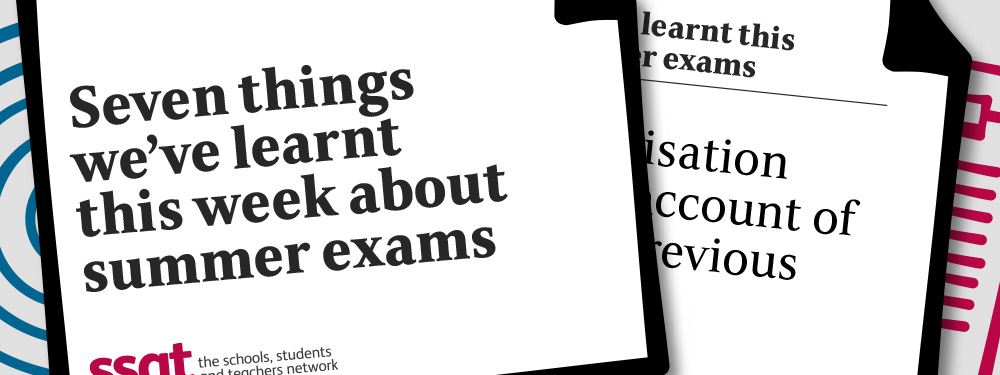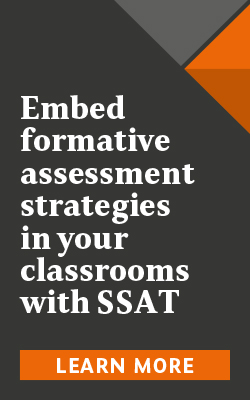
Last Friday, Ofqual published their full response to the consultation for awarding results in GCSEs, AS and A levels, other general, vocational and technical qualifications this year. Tom Middlehurst, Head of Policy and Public Affairs at SSAT, has reviewed the response and comments on its key points.
1) Standardisation will take account of schools’ previous results
As expected, the national standardisation will include a school’s previous results. This will come as a blow to some schools who were genuinely expecting a better set of results this summer, with similar cohorts. The standardisation will use GCSE results from the last two years, and A-level results from the last three years, where available. Ofqual are also considering how to calculate grades for schools without previous data.
2) There’s no chance for appeal or to make your case
That’s right. Even if, hand on heart, you know that results would have been better, there’s no opportunity to make this case or to appeal the final grades on the basis of this. Ofqual acknowledge there are a number of reasons why results might improve: new teachers, improved teaching, learning and curriculum, and less crossover with Ramadan for example, but understandably say there would be no fair way of taking these into account.
3) Standardisation is at subject level: not school, nor student
The standardisation formula exam boards will be done on a subject-by-subject basis; not your overall Attainment 8 scores. This means that historically stronger subjects needn’t be concerned by overall poorer performance. It also means that individual students won’t be standardised, just that subject’s cohort as a whole. So, if a student is performing far better than national predictions would suggest, they’re not at a disadvantage.
4) Therefore, the rank is king
Again, Ofqual highlighted the importance of the rank. As schools prepare to do their final checks before submission from 1 June to mid-June, it’s crucial they are confident in the rank. The centre-assessed grades may be moved up or down, but the rank won’t be changed. Pay particular attention to students at the tops and bottoms of each grade, as these are the ones who are most likely to have their grades changed through standardisation.
5) Private candidates won’t affect your on-roll students’ grades
I don’t quite get this one – but apparently Ofqual are confident that, as long as you have enough evidence to make a professional judgement of a private candidate’s likely grade, placing them in the rank list won’t affect your student’s chances. The devil will be in the detail. It seems to me that, for example, placing a private candidate higher than a student within a grade would affect that student’s chances of being moved up or down. We’ll wait to see what they mean by this….
6) Autumn series trumps appeals
That’s not quite true. But the appeals process is, happily for schools, reasonably limited this year. Candidates must appeal through centres, and centres can only appeal on their behalf if they genuinely think the data they submitted has become corrupted or used incorrectly. Students can’t appeal on the basis of decisions about the centre-assessed grade or rank order, and (as above) schools can’t appeal against the standardisation model. Instead, students who are unhappy with their grades should be encouraged to sit the autumn exams – proposed for October for A-levels and November for GCSEs. As such, rather than encouraging appeals, the general response from schools to unhappy students or parents should be the autumn resits.
7) Don’t overthink the data, but manage expectations
Okay, this isn’t directly from Ofqual, but resonates with their key messages. Ultimately, in June, schools are being asked to say – hand-on-heart – as accurately and with as much integrity as possible – what a student would have got had they sat exams this summer (not the same as their working-at grade – students perform differently under exam conditions). Therefore, if you genuinely think you would have got better results this summer, then say so. Transition matrices and comparisons with previous results may be a useful sense-check, but at the end of the day trust the professional, expert judgement of staff. Certainly, SSAT would advise against trying to perfectly match your submitted grades to the raw data. That being said, if you submit a genuine increase, then it’s worth managing the expectations of staff and governors that these grades might be marked down. After all, Ofqual acknowledge that all centres should expect to see some change to their CAGs. But remember – you absolutely must not reveal either the CAG or rank order to any student or parent until after results are published in August; but after that – well, read the blog I wrote last week or watch our data webinar with Wrigleys Solicitors.
But for now, try to have a break over half term. The media and some politicians have been beasts to teachers over the last week. We know you want to get welcome back increasingly more of your students as soon as possible – especially to support disadvantaged learners – but only when it’s scientifically safe to do so. As teachers and school leaders, you do amazing work, and I know that you will continue to do so during this crisis.
- Tom is available to deliver online policy briefings for small groups of your school or trust’s SLT, HODs or governors. These sessions can be tailored to your specific requirements and will cover the latest issues and policy updates. You will also have the opportunity to ask questions and take part in open discussions with your teams. Get in touch with our dedicated team or call 020 7802 0955 for further information.

